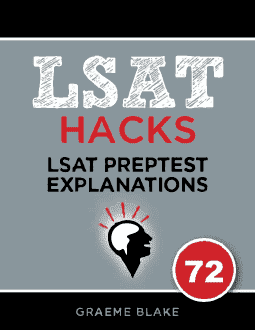QUESTION TEXT: Journalist: Scientists took blood samples from two…
QUESTION TYPE: Flawed Reasoning
CONCLUSION: Genetics can make you dislike vegetables.
REASONING: Volunteers who don’t like vegetables have the XRV2G gene.
ANALYSIS: This is a classic LSAT error: the false comparison.
We’re told that the vegetable hating group has XRV2G. But we’re not told about the group that likes vegetables. Maybe all of them also have XRV2G! A proper comparison must tell you about both groups, not just one.
___________
- The argument didn’t say this. Something can’t be a flaw unless it happens. The argument just said one trait might be genetically determined. It didn’t say all traits are.
- This answers plays on a misunderstanding of bias and representativeness in studies.
Let’s say you do a study designed to test whether a certain drug cures cancer. And all the subjects are American. Americans are unrepresentative of humans in many ways:
* They’re richer than average
* They live in a country that starts with ‘A’
* They watch more TV
* They have more internet access
All of those are unrepresentative, and none of them are relevant to the question of whether a drug cures cancer. So unrepresentativeness in one or more areas does not necessarily mean a study if flawed! - This means: mistaking a sufficient condition for a necessary condition. That’s not what happened in this argument.
- This possibility would strengthen the argument! It’s not a flaw to overlook it. the conclusion was that genes may affect whether we like vegetables. So the more that genes affect our taste for vegetables, the better.
- CORRECT. If everyone has the XRV2G gene, then it can’t affect vegetable tastes.


hi,
Graeme i was wondering if you could explain why this question isn’t a correlation/ causation flaw. i know that there is no answer choice that reflects this but i was wondering if that is a possible flaw in reasoning.
Good catch! False comparison and cause-correlation flaws are very similar. On the LSAT, to say that there is a cause and effect relationship between two things is to say that the cause always produces the effect and that if the effect is present, the cause is present as well. When you make a false comparison, you’re ignoring the possibility that the cause can exist without the effect or vice-versa (e.g. the gene can be present in the group that likes vegetables too). So, a false comparison is a lot like a cause-correlation flaw, because the latter also suggests that just because a relationship exists between two things, doesn’t mean that when one is present, the other is always present.